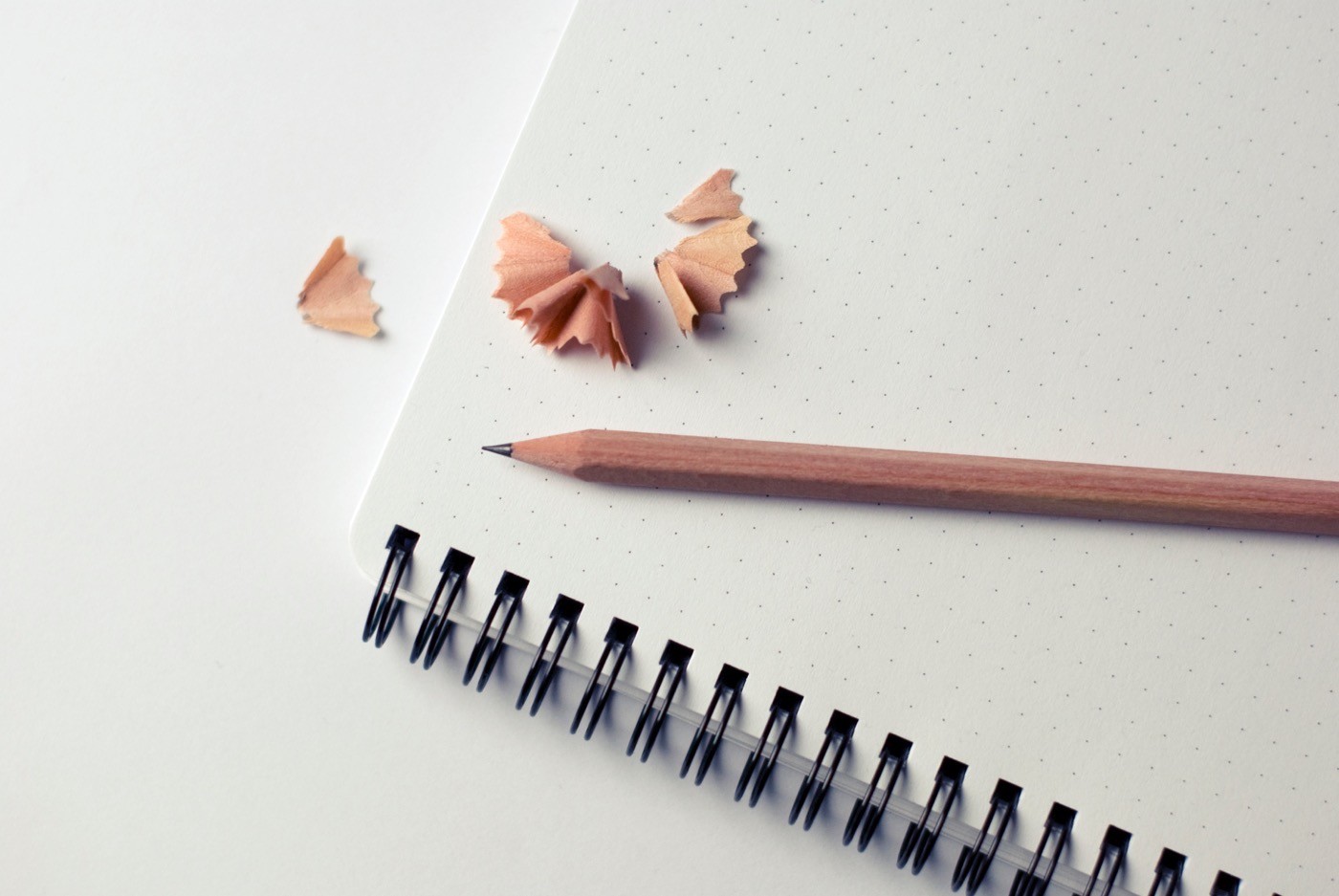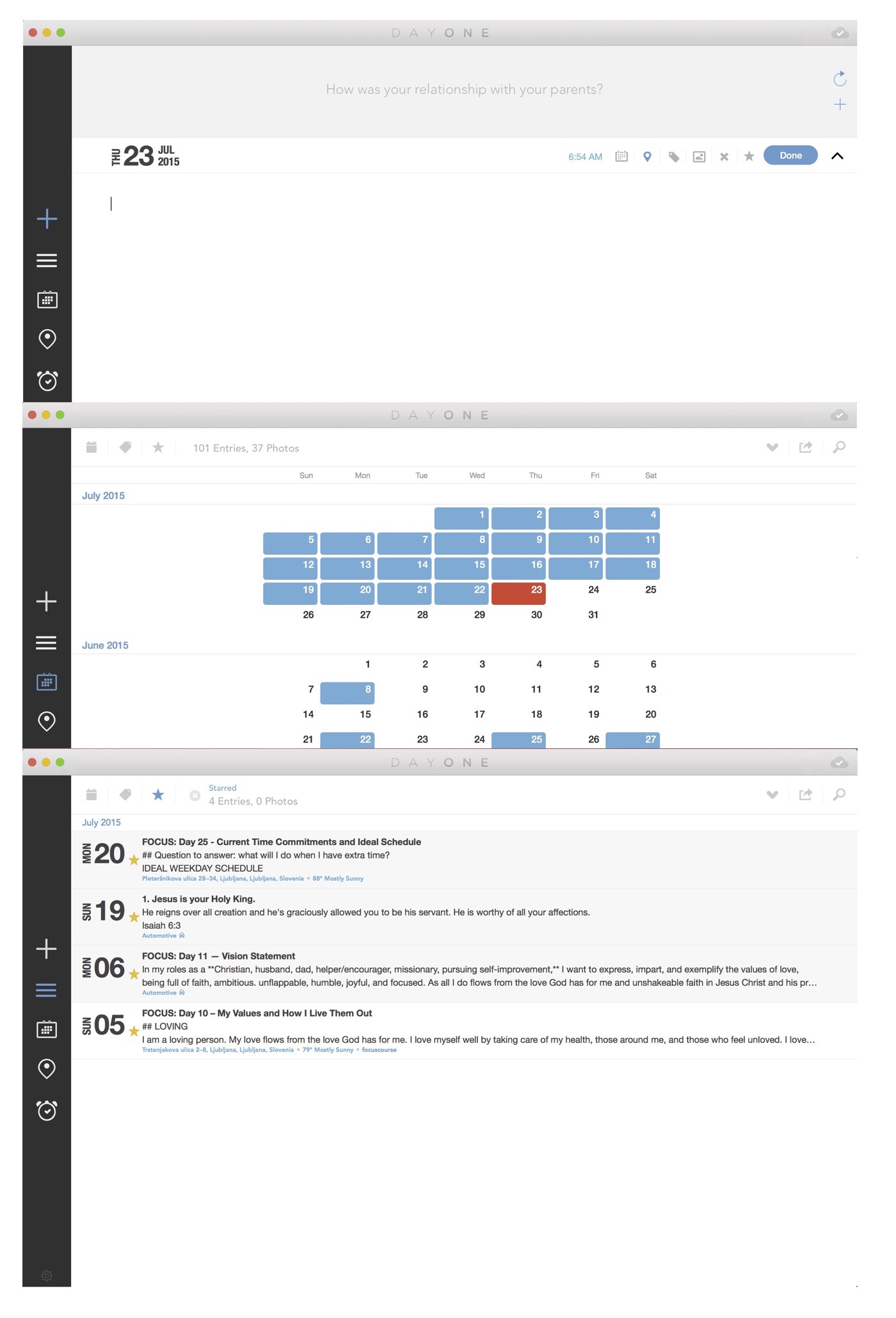I’ve never been a faithful journaler.
For a season, I did a good job of writing down prayer requests, what I was learning, and the occasional event. That season was short lived.

But for nearly the last month, I’ve written down something in the form of a journal every single day.
Not bad for an unfaithful journaler. Here’s why and how I picked journaing back up.
Why Should We Journal?
The benefits abound, and it’s amazing how journaling can benefit us in relation to the past, present, and future.
To Pause and Reflect (The Present)
It’s easy to live each day, keeping your head down, doing the things you need to, punching in and punching out for work, making dinner, taking care of the kids, and then you look up one day and your kids are going to college, your 20 pounds overweight, you haven’t read the Bible or prayed in weeks. You don’t recognize yourself any more.
The daily grind can keep us from reflecting on how we’re doing and what’s really going on.
Journaling is an opportunity to pause, reflect, and correct course as necessary.
In a busy, constantly connected world, it’s hard to take a moment to ourselves, move beyond just treading water, and see how we’re really doing.
Journaling is that quiet opportunity to have a meeting with yourself and make a few observations.
To Learn and Prepare (The Future)
Once we take the time to observe, we have an opportunity to learn.
It’s hard to judge our progress if we don’t measure it.
You know the old “measure twice, cut once” rule of woodworking?[footnote]If you don’t, you are likely a pretty frustrated woodworker.[/footnote] It applies in life and journaling too.
One bad day doesn’t mean our life is falling apart, and one good day doesn’t mean we’re on track to do all we hoped.
Consistent journaling allows us to compile a history of the ebbs and flows of life. How we’re doing, what we’re thining about, struggling with, and looking forward to.
It’s an opportunity to learn from our mistakes, build on our successes, and continue down the path of becoming the people we want to be.
To Look Back and Remember (The Past)
The faintest pencil is better than the strongest memory.
Humans are a forgetful breed. At times, I can hardly remember why I walked into another room.
Journaling allows us to look back and remember laughing with our spouse, kind things people said, and, most importantly, the goodness and providence of God.
Memories are meant to be cherished. Forgotten memories are impossible to relish.
Everyone has something in their life to look back and be grateful for. Journaling helps surface that gratitude more frequently.
Why Don’t We Journal? (and How Do We Fix It?)
Ok, so maybe you’re sold on journaling. But why do most people have the good intentions of keeping a journal yet fail to follow through?
It Takes Time
Like every activity in the world, journaling takes time. The problem is, it’s the natural resource most of us (claim) we are most acutely lacking.
Thinking about filling up a whole journal is daunting.
But what if we started with just writing down a single line? That seems doable.
We’re an ambitious bunch, and most people, when trying to form new habits, go way overboard.
You want to lose weight so you buy a gym pass, work out for 2 hours, and never go back again because you can’t walk right the next morning.
With journaling, start small. A sentence or two is a great start. At the end of a month, you have 30 more sentences than you did last month, and at the end of the year, you could have lines and lines filled.
Solution: Start small.
Write one line each day, and if you have an extra minute here and there, jot an extra line.
A sentence from every day of your year beats the socks off one mega paragraph from that one day. You’ll have a greater scope and view of your life and year if you jot it down bit by bit.
It Takes Effort
But what will you journal about? After deciding you’ll be committed to actually keeping a journal, knowing what you’ll write about is the next most difficult task.
This is an easy fix: have a set list of questions you can easily respond to in a moment that helps you evaluate your day, see where you can improve, go to bed grateful.
Solution: Create a list of questions
I recently mentioned a few questions I use to evaluate my day in my evening routine. I’ve since added one more. Here are the questions I answer at the end of each day. The first is about the past, the second concerns the present, the third helps me for the future, and the fourth is about preparing for the next day.
- What did you accomplish today that was important?
- What are two things you’re thankful for in your life right now?
- What’s one thing you wish you did differently today that you can improve on in the future?
- What is the one thing I could do tomorrow to make it a successful day?
It Takes Consistency
Journaling is only valuable if you do it consistently. For me, I need a reminder or I won’t do it, and I need it to be easy or I won’t follow through.
Solution: Set a reminder and have your questions pop-up
I’ve been using Day One to record my daily responses to my four questions. There’s an option to set a reminder so I get an alert at the end of my day to fill out my journal. Every day at 9:10pm, Day One tells me to do what I said I would do.
This little timer has helped me stay consistent and accountable to myself. Getting into the habit of keeping your journal at the same time each day makes faithfulness to your goal even easier.
I hop into Day One, type my Text Expander snippet which generates my four questions, and I take 60 seconds to fill out my mini-journal. That’s it. This is still a young habit for me, and I don’t want to do it. Four questions can improve my perspective and still give me something significant to look back on.
It Takes Organization
If you wrote your journal on scrap pieces of paper that you didn’t hold onto or organize, you’d be awfully frustrated when you wanted to go back and reference your notes from previous days.
A paper journal is the most classic way to keep a journal, but I don’t think it’s the easiest.
That’s why I suggest the aforementioned Day One.
Solution: Use Day One
Day One is absolutely gorgeous. The app is well-designed, available for Mac and iOS, has the ability to set reminders, use tags for simpler searching, favorite certain posts, add pictures, and add entries into the past.

Honestly, I’ve started using Day One in the way I used to use Evernote because it’s simpler to navigate and I’m more likely to actually go back and look through Day One. It syncs perfectly across devices, allows you to see the days you actually wrote something at a glance, and even imports location, time, and weather data if you’d like.
Day One is well worth the $5 on iOS and $10 for the Mac.
You can’t put a price on remembering your memories. If you could, I think it’d be for than $15.
Wrapping Up
Starting a journal is something you’ll never regret. You can start now or start 10 years from now and wish you’ve been doing it your entire life.
Start small, answer a few of the same questions every day, stay consistent by setting an alert, and use a beautiful app or journal to make the process more enjoyable.
You won’t regret it.